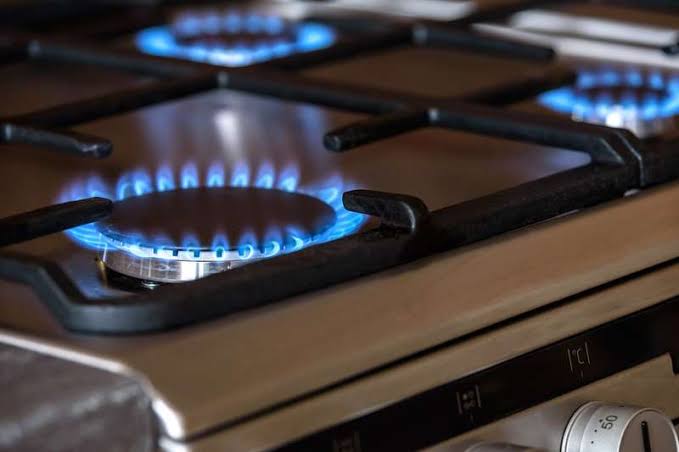
By Esther Oguntuase, Akungba Akoko
The unlimited usage and acceptance of cooking gas in homes, schools, and restaurants can be said to be a life easy curtain-raiser that has helped lessen stress, tension, and hardship of the people.
Liquefied petroleum gas (LPG) is a fuel gas that contains a mixture of gases such as propane (C3H8) and butane (C4H10). LPG is a flammable derived during the refinery process of crude oil. It is used for industrial purposes and widely for domestic purposes in Nigeria. Reasons being that it is convenient. Cooking gas in households provides 100% maximum convenience in terms of speed, heat production, and spruceness when compared to other heating appliances. It is faster, eases stress, and is more reliable in times of emergency because it has a greater heating value. It is also preferable because it gives the cooking space and equipment such as pots, a neatly-preferred look.
Students of tertiary institutions have tossed out from the outdated conventional method of cooking either with firewood, charcoal, or stoves and now adopted the use of gas in domestic cooking to make the school environment clean, to probably aid the standard of living and make life and learning easier for concerned persons.
Everything good in life is always said to have its bad side, just like gas has its adverse effect despite all the numerous advantages, it can sometimes be hazardous if not well managed. Gases are piped from the cylinder to the burner and if peradventure the gas leaks, it will evaporate and settle in expanse which might result in a fire outbreak, explosion, or risk of suffocation that can claim lives.
Lately, there have been cases all over the country of flame eruptions which is a resultant effect of cooking gas. A fresh but awful case of gas explosion recently occurred in Adekunle Ajasin University, Akungba, Akoko (AAUA) on Saturday 23rd of January in Adefarati, an area close to the school main gate. The tragic disaster claimed some precious lives of students and the situation had raised concern, fear, questions, and solutions to prevent any further or future occurrence. Students of the university and other tertiary institutions have raised an alarm and voices on the possible ways of preventing such menace from reoccurring amidst students.
Akin Mike, a 200L student of computer science disclosed that there is nothing wrong with the use of cooking gas in households if instructions given are well followed. He stated these instructions as; putting away phones, anything that might ignite flames or cause distraction and make students lose focus while cooking. He further suggested that students should be dissuaded from cooking inside their rooms and space should be provided for cooking outside their rooms. “The use of gas requires so many safety precautions which surely a student would not follow,” He further noted that gas cylinders should not be stored for a long period. The quantity of gas purchased should be sufficient for only short-term needs.
Oyetunde Mujeeb Oyetomiwa, a National Diploma 2 (ND 2) student of civil engineering at Fedpoly Ede explicated that everyone takes risks as sleeping to waking up the next morning isn’t sure cause God determines it. The adoption of cooking gas was effectuated by technology and any country that does not align with the aspect of technological advancement will not be recognized. To flow with the trend in developed countries, there is a need to practice and make use of materials or equipment brought by innovation.
He added that using cooking gas by students in their rooms might not be right but they can’t be barred from using it because it is time-saving. Students are to be well-informed of the implications of negligence.
“Use the gas in your room and be smart about it.”
Agboola Anuoluwapo, a 300L student of the computer science department at Federal University of Kashere Gombe state expressed his opinion that the utilization of cooking gas at home is right if necessary precautions are taken because it makes cooking to be done in a faster and organized way compared to the stove. He explained that the use of gas in a hostel room is bad and many things can lead to fire outbreaks. Sometimes when gas is used in a hostel room, it will be stuffy and if there’s a case of leakage, it will easily start a fire.
“At times, students can be careless. They hurry to catch up with lectures and in the process, they probably forget to turn off cooking gas properly or when cooking, they might want to get something and likely delay in returning which can result in a fire outbreak or explosion”.
Ubon Etim, a 200L student of Linguistics and Languages referred to cooking gas as the best and fastest means of cooking in the country with the exclusion of electric cooker. He asserted that everything has its disadvantages, even the cooking stove, and electric cooker. He remarked that the dangers that might occur when using a cooking gas can be avoided if cylinders are properly checked, the pipes are well connected and the use of cell phones near gas is avoided.
He emphasized that cooking inside the room is not right but if students stop the use of gas in their rooms, they can’t possibly go for charcoal, he said.
Idowu Abdulwahab Adekunle, a 300L student of electrical electronics engineering at Olusegun Agagu University of science and technology noted that cooking Gas has a lot of advantages such as easy usage, neatness, and cost. He suggested that matches should be lit before turning on the cylinder burner which is to prevent the spread of gas from filling the room.
“It should also be positioned away from where we sleep and engage in other activities just to be on the safer side”.
Adejare Mercy, a 300L student of biochemistry reacted to the use of cooking gas at home as not “not harmful” if the users heed to precaution. She explains that these guidelines are; to keep cylinders cool always by opening windows and doors in the kitchen to allow ventilation. Proper monitoring of food on fire while cooking is also another issue. She said, “some people will be cooking on a gas and leave it to do other things, this is very risky”.
She further added that keeping phones away while using cooking gas doesn’t mean they can’t be placed in the same room while cooking. “It simply means that phones should not be used in the process to prevent and avoid overheating because if there’s a gas leakage, there is a high tendency that it will react. An overheating phone might produce an arc of electricity which can cause a fire outbreak when it reacts with propane”.
Abdulrasheed Hammad, a 300L student of the law department at Usmanu Danfodiyo University, Sokoto asserted that it is right to use cooking gas at home because it is the fastest and easiest way of cooking.
He opined that it is not right for students to use gas cookers because they are careless. “They are negligent to the extent that they place and use stove and gas cylinder side by side”. He mentioned that although it is good for students to use, it is not advisable.
Faith Alonge, a 300L student of English and literary studies at Obafemi Awolowo University stated that cooking gas is more efficient, fast, reliable, easily accessible and every family should acquire it if they can afford it to ease their living conditions. She asserted that students should not use gas cookers in their rooms because of the danger it poses though it is inevitable because of the housing conditions of students on and off-campus which is very poor.
“Most of the students stay in a one-room apartment which leaves them with no other option than to cook in their rooms. My only advice is for students to be careful while cooking not to bring their phones closer to the cooking gas”.
Ikulajolu Adesola, a 400L student of the mass communication department also expressed his opinion that the use of cooking gas is good at home, school, or anywhere it is used but just that caution needs to be taken. He raises objections that students are sometimes careless and this could result in bad circumstances.
For preventive measures, he added that students cannot be stopped from using it because it alleviates stress and meets up with current cooking trends but measures must be adhered to so as not to fall victim to fire outbreaks. “Students need to caution themselves because the use of cellphones close to cooking gas can be highly flammable.”
Bamigboye Azeez Omogbolahan, an ND 3 student of electrical electronic engineering at Yaba College of Technology says that the use of cooking gas depends on the individual because the level of maintenance and care varies. All students cannot be cautious and meticulous in the same way so they should not use cooking gas.
Akinbulejo Pius Olorunwa, a 200L student of the law department at Igbinedon University Okada, Edo state remarked that cooking gas is never a curse to livelihood. It is gradually usurping the position of the kerosene stove. Even though it is not cheaper than kerosene, it is a cheaper option because it lasts longer and cooks food faster thereby saving fuel. The flame is also not hazardous as that of the stove.
He further added that there’s nothing without a disadvantage but the use of cooking gas where students live is not advisable. “Though fingers are not equal, those that cannot afford a room with a kitchen can place it in their room and abide by the rules and regulations that guide the use of cooking gas”.
He proffers some precautionary measures to be put in place by its users as; creating an exit roof in case of an emergency as stipulated in the labor law act. Perform regular inspections and embrace maintenance culture.
Considering that the use of gas is not a new leaning and it has now been embedded in each household’s cooking system, adherence to precautionary measures is the only way to preventing the perilous occurrence of an explosion. The most cogent remedial measures are to put all cellphones away from the cooking space. Check through cylinders before and after use to ensure proper connection between the cylinder, the linking pipe, and the burner.
Avoid every form of distraction and keeping an eye on whatever one is cooking and largely, keeping away flammable objects or substances from the cooking gas. These substances include; sprays, pesticides, etc.















